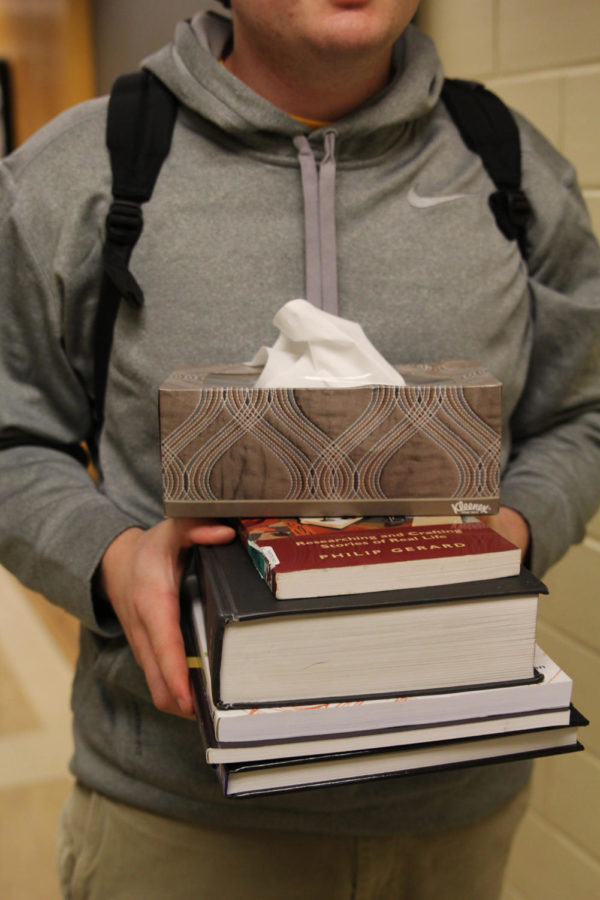Cummings: Too much classwork detracts from learning
Illustration: Kelby Wingert/Iowa State Daily
The piling up of classwork and other stressors such as part-time jobs, internships, club activities and networking can do real harm to students health and general well-being.
December 10, 2013
The weather outside lately has been frightful indeed, and so have the workloads for college students everywhere.
With the semester winding down to an end, even the students who haven’t been procrastinating on those end-of-the-year projects are beginning to feel the pressure. And while the well-meaning professors who assigned these piles of homework were only trying to further students’ educations, they may actually be contributing to low attendance in class.
It might come as no surprise that in a survey cited by NBC News, one in five college students claim to feel stress all or most of the time. This constant stress can have some harrowing effects on the body, according to Psychology Today, including some severe issues such as cardiovascular disease and diabetes as well as problems with the immune system.
A badly-functioning immune system is one of the reasons college students are getting sick. With their bodies’ natural defense systems taking a break, they have a hard time fighting off a simple cold or the flu. Naturally, an increase in sickness means a decrease in class attendance.
So what are professors to do? If students aren’t attending classes, they’re not learning the concepts. Though some classes provide assignments and PowerPoints online, some classes are based strictly off classroom discussion, making learning extremely difficult for students who are unable to attend class.
Professors assign homework so students can continue their learning outside the classroom. This helps them better learn not only their class material but also the skills necessary for success in their future lives. Professors are simply doing what they’re supposed to do: teach.
The problem, however, with loads of lengthy assignments is that they in fact might be contributing to students not learning the materials. When a student is stressed about getting so much homework completed — and not only completed but completed well — a vicious cycle is formed.
When a professor assigns a 10 page paper, for example, it is not unlikely that the following situation might play out: The student is assigned a paper from one professor; four other professors assign equally lengthy projects due on or near the same day as the first paper; the student stresses out about getting all of it done; the student stays up late in the night working on homework and losing sleep; the student has to skip a class here or there in order to get the assignments done on time; the student catches a cold and has to miss another class in order to catch up on needed rest; the student begins to fall behind in other course materials because of missed lectures; the student stays up late in the night to complete missed assignments; the student is finally able to attend class but is too tired to pay much attention and falls asleep in the middle of lecture.
Though this scenario might be extremely exaggerated for some students, for others, this is the reality of college. Much of that cycle could be ended if students took it upon themselves to plan for assignments accordingly and, if it came to it, ask for extensions. But even the most disciplined students can fall behind if they don’t always remain on top of their game.
It is unrealistic to ask every professor to plan their syllabuses with each other so that major projects and papers don’t continue to pile up on students all at once, but would it be so unrealistic to ask for fewer major projects and papers?
If there’s anything to be taken from the example “cycle,” it is that students are missing more class time because of stressing schedules. What purpose do assignments really serve if students are not learning the materials in class in order to complete them? Students would undoubtedly gain far more knowledge if they were able to spend the majority of their time in lecture and not stressing out over upcoming homework deadlines.
College students have a lot to worry about: getting a job after college, getting a job during college, relationships, money, club activities, networking, building a resume and an infinite number of other stresses. All of these stressors also significantly contribute to a student’s potential inability to make it to class.
However, only schoolwork is able to be regulated to help minimize stress. And while asking for less homework might seem silly, unrealistic or juvenile, it is equally unrealistic to ask students to always attend lecture and learn when they’re so busy trying to complete all these assignments.







